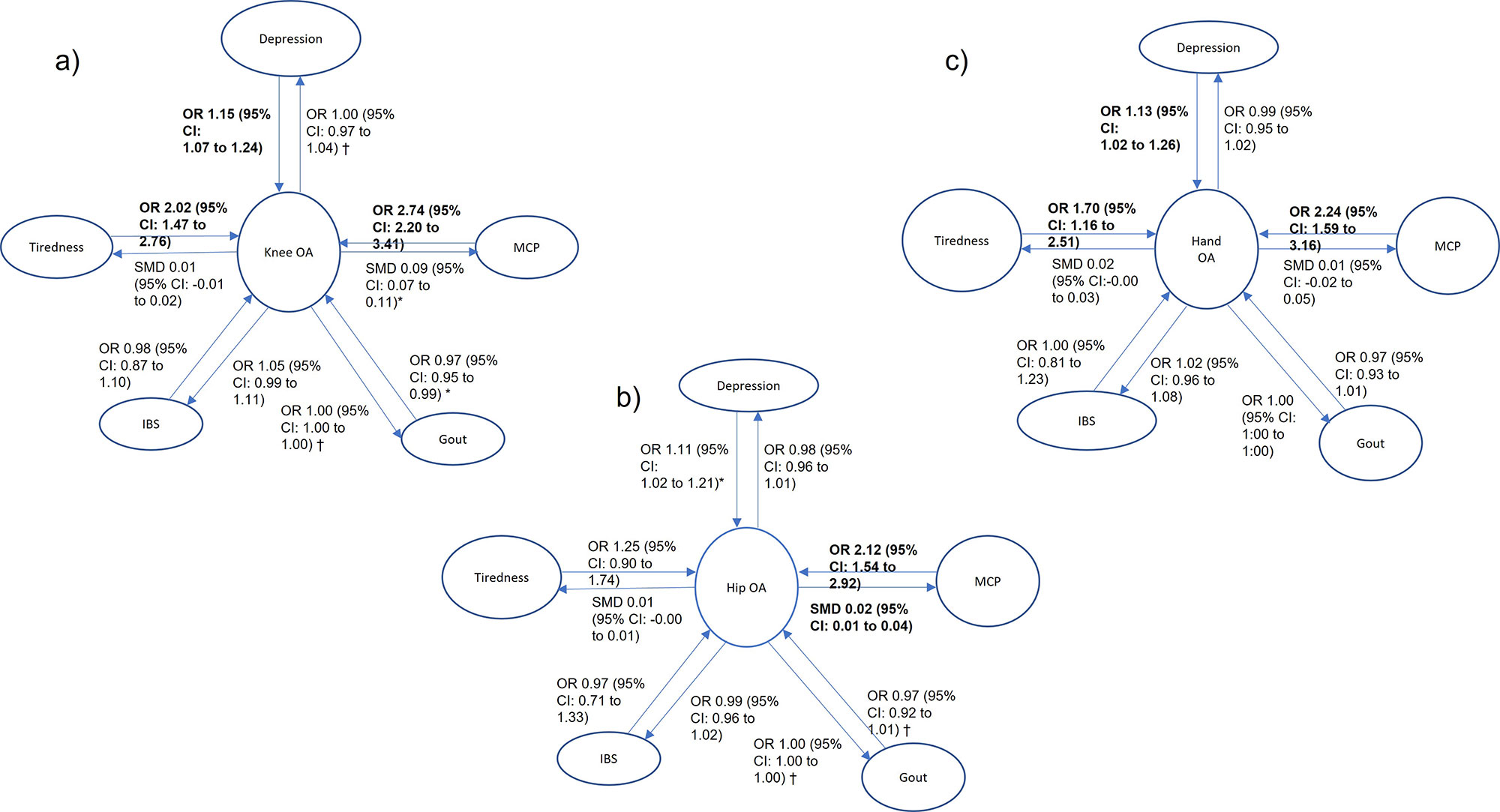Session Information
Session Type: Poster Session C
Session Time: 1:00PM-3:00PM
Background/Purpose: Osteoarthritis (OA) is the most common cause of joint pain and a major cause of disability. OA commonly associates with other conditions, such as depression, self-reported tiredness, multisite chronic pain (MCP), irritable bowel syndrome (IBS) and gout. This raises the question as to whether these associations are causal or associate through shared risk factors such as aging. We investigated this using Mendelian Randomisation (MR).
Methods: This study used a two sample MR framework. To select the genetic instruments, i.e., single nucleotide polymorphisms (SNPs) for OA, we used data from the largest and most recent genome-wide association study (GWAS) of OA (GO Consortium), with a focus on OA in the Knee (Knee OA; 396,054 participants), Hip (Hip OA; 353,388 participants) and Hand (Hand OA; 303,789 participants). We selected SNPs of included comorbidities from a number of GWAS data sets, such as a GWAS for Depression (Howard et al 2019, 807,553 participants), Tiredness (MRC-Pipeline, 449,019 participants), MCP (number of body sites with pain > 3 months on a 0-7 site scale, Johnston et al 2019, 387,649 participants), IBS (Eijsbouts et al 2021, 486,601 participants) and Gout (Sandoval-Plata et al 2021, 61,882 participants). With the data available, we performed a bidirectional MR analysis, measuring both the causal effect of OA on each of the included comorbidities and vice versa, using SNPs identified with linkage disequilibrium clumping. Standard Mean Differences (SMD), or odds ratios (OR) and their 95% confidence interval (CI) were estimated using a standard inverse variance weighted analysis. A sensitivity analysis using the GWAS of OA excluding UK Biobank was also conducted to check for consistency.
Results: There was consistent evidence of a causal effect of Hip OA on MCP (SMD 0.024, 95% CI 0.012 to 0.036). For all other comorbidities, the causal effect of OA was either not detected or inconsistent between the main and sensitivity analyses. There was consistent evidence of a large causal effect of MCP on all types of OA, as well as depression and tiredness on Knee OA and Hand OA (Figure 1).
Conclusion: Apart from Hip OA to MCP, other sites of OA do not have strong causal effects on these comorbidities. In contrast, MCP, depression and self-reported tiredness have a strong causal effect on OA, which is in line with both a central pain sensitisation hypothesis and a delta sleep deprivation hypothesis. Triangulation with other methods is required for confirmation.
To cite this abstract in AMA style:
Thompson W, Swain S, Zhao S, Kamps A, Coupland C, Kuo C, Doherty M, Zhang W. The Causal Association Between Osteoarthritis and Common Comorbidities: A Mendelian Randomisation Study [abstract]. Arthritis Rheumatol. 2022; 74 (suppl 9). https://acrabstracts.org/abstract/the-causal-association-between-osteoarthritis-and-common-comorbidities-a-mendelian-randomisation-study/. Accessed .« Back to ACR Convergence 2022
ACR Meeting Abstracts - https://acrabstracts.org/abstract/the-causal-association-between-osteoarthritis-and-common-comorbidities-a-mendelian-randomisation-study/

